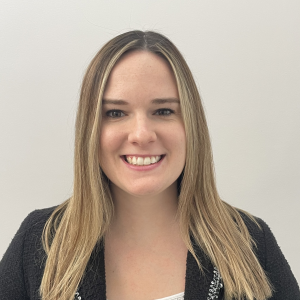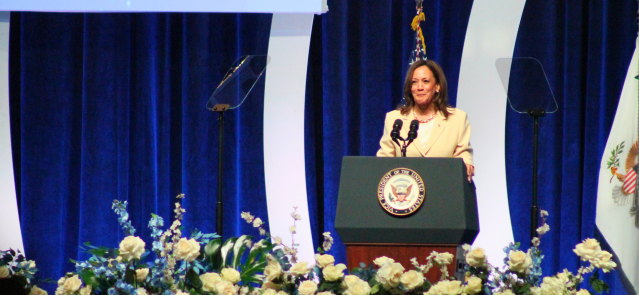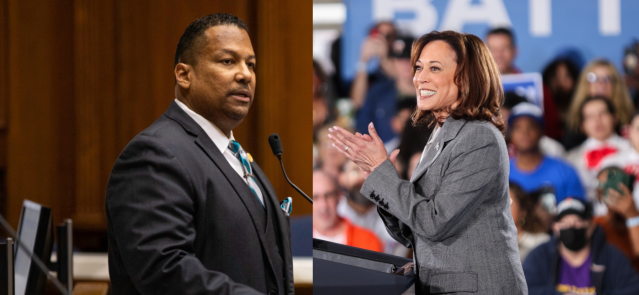Stay ahead of the curve as a political insider with deep policy analysis, daily briefings and policy-shaping tools.
Request a DemoFive issues likely to come up next legislative session, and two that won’t move
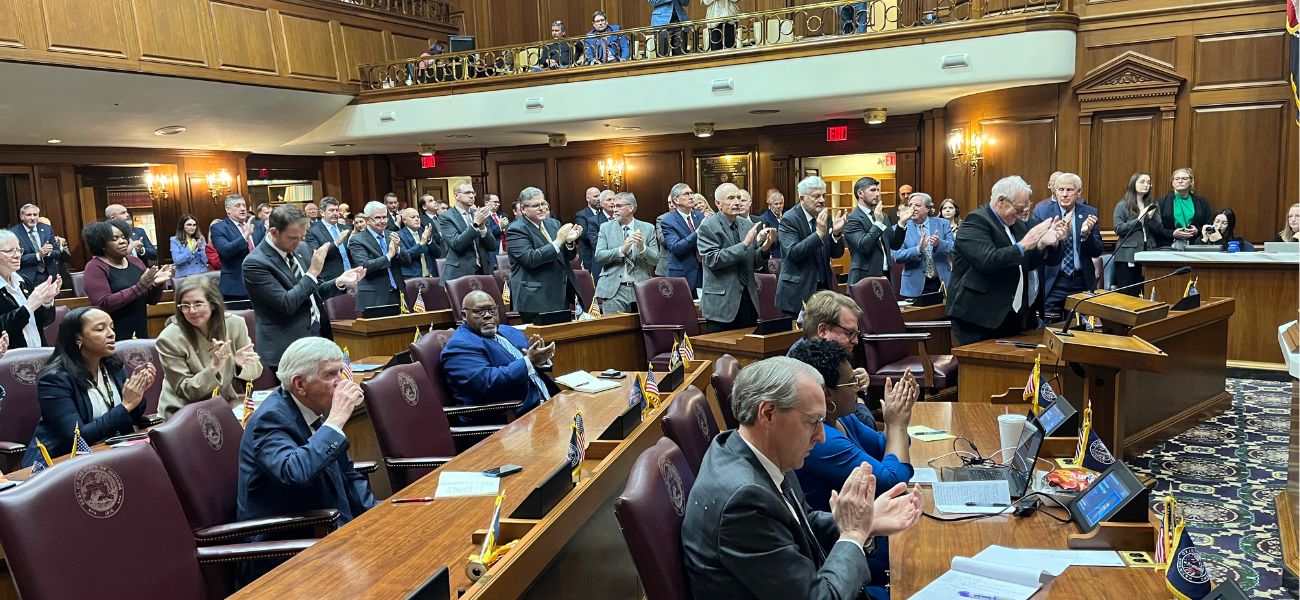
Lawmakers clap in response to House Speaker Todd Huston's speech on Organization Day, ahead of the 2024 legislative session. (Credit: Kaitlin Lange)
The gist
On Tuesday, Indiana lawmakers returned to the Statehouse for Organization Day, the ceremonial start to the legislative session, ahead of what legislative leaders are saying should be a low-key, short session.
“We’ll probably take a pretty measured approach on what we address … , maybe fine tune some things,” House Speaker Todd Huston, R-Fishers, said during an Indiana Chamber of Commerce legislative panel on Monday. “Short sessions are supposed to be for emergency items only.”
Not only will 2024 be a non-budget-writing legislative session mandated to end by mid-March, but this session also falls in the midst of a heated Republican gubernatorial primary. There’s no obvious assumed winner who can lead policy discussions ahead of the election, nor has Gov. Eric Holcomb laid the groundwork for any major policy changes in his last legislative session.
Plus, recent criminal corruption charges against a former lawmaker — and the potential for other lawmakers to be charged in connection with the case — has put a cloud over the Indiana General Assembly.
Still, some minor bills are expected to move, and something can always pop up. Here’s a breakdown of some of the issues State Affairs expects to be debated, and three that probably won’t move.
Reading proficiency
Both Huston and Senate President Pro Tem Rodric Bray, R-Martinsville, said they want to limit the situations in which schools allow third graders to advance to fourth grade when they fail the IREAD-3, the state’s reading comprehension test.
During the 2021-2022 school year, more than 18% of students failed the test because they were not reading at a third grade level.
“When you pass that kid on, and they aren’t prepared to succeed, you’re not doing that kid a favor,” Huston said, following his Organization Day speech in which he laid out his caucus’ priorities.

Huston’s goal is to make Indiana the No. 1 state in the nation for third grade reading proficiency by 2027.
Democrats cautioned that it may be too soon to make major changes to how IREAD scores are handled in Indiana. During the 2023 legislative session, lawmakers passed a science of reading bill.
“We need to make sure that schools have the opportunity to train their teachers, to implement these strategies across the board before we start throwing new legislative hurdles in the way,” said Sen. Andrea Hunley, D-Indianapolis. “We have to give [new recommendations] time to work before we start, say, failing all children or retaining a whole class of children.”
Continuing to re-think K-12 education
Last legislative session, lawmakers passed a bill seeking to expand work-based learning in high school, but Huston emphasized during his Organization Day speech that legislators can still do more to transform the K-12 school system.
Huston said House Republicans will push to allow state money typically set aside for students pursuing a college education to be used to obtain certificates and certifications for “high demand, high wage jobs.”
“We must continue to adjust the way we think about K-12 education in order to meet the needs of all students, including those who aren’t interested in pursuing a two-or four-year degree,” Huston said. “Let’s use this session to build on skill and work-based learning, and let’s align our funding to this goal.”
This fall the Indianapolis Chamber of Commerce took a delegation of Indiana lawmakers and others to Switzerland to see how the country’s apprenticeship program operates. Expect more changes in the coming years that would enable Indiana’s K-12 system to more closely mirror that of Switzerland’s.
Child care access
During his own Organization Day speech, Bray emphasized a need to expand affordable child care options for young children.
“Day care is a constant challenge from the Ohio River to the Michigan line, trying to find day care at all if you can find it and whether it’s affordable,” Bray said.
He pointed to a legislative study committee on the topic which recommended some minor reforms to the system, such as lowering the age requirement for working unassisted in an infant or toddler classroom to age 18 from 21 and requiring the state to review how it can streamline child care regulations to increase availability.
Don’t expect lawmakers to throw more money at the child care system since 2024 isn’t a budget-writing year.
Health care costs
Lawmakers passed multiple bills during the 2023 legislative session aimed at cutting health care costs, ranging from limiting physician noncompete agreements to creating benchmarks for how high hospital prices in the largest hospital systems should be.
But Bray said he expects lawmakers to offer more legislation on the topic this year in order to help drive down costs long term.
A legislative study committee on the topic backed recommendations to require more disclosures by insurance companies on their “prior authorization” process for medical care, as well as require medical providers to give lawmakers a six-month notice for mergers or acquisitions.
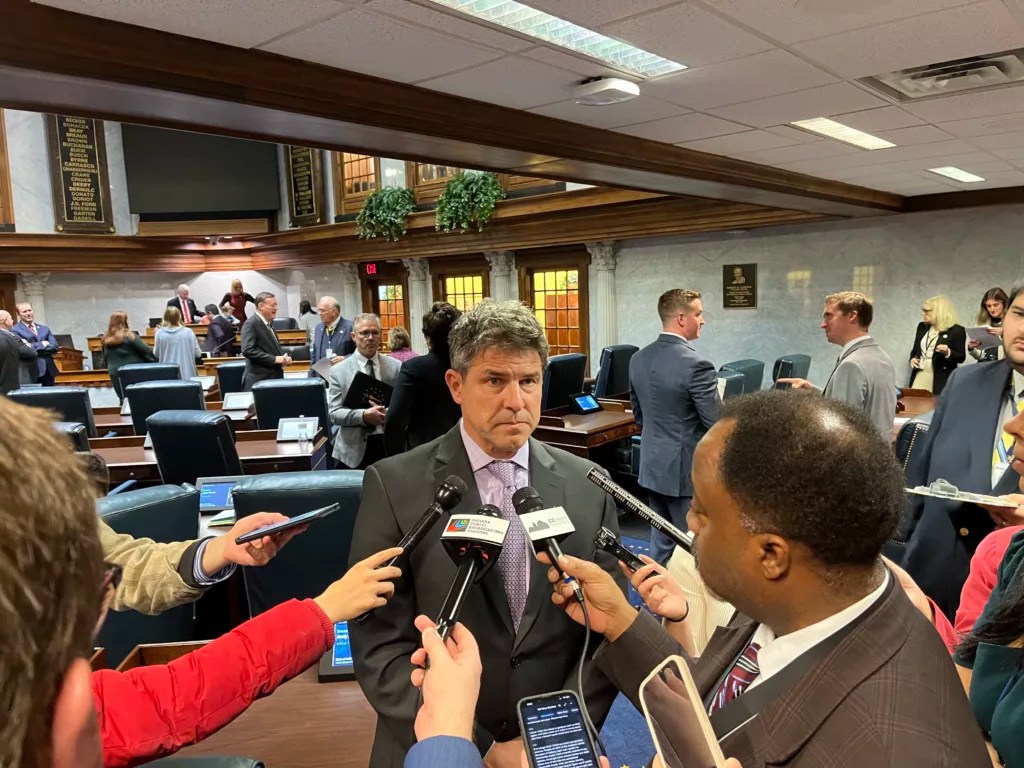
Water access
It’s unclear whether legislation on water access will actually pass either chamber, but the topic is almost certain to come up in discussions.
Earlier this year, the Indiana Economic Development Corp. announced plans to pump water from the Wabash River aquifer to the LEAP district in Lebanon. Tippecanoes citizens have been vocal in their opposition to the plan, and just this week the Tippecanoe County Commissioners voted to put a moratorium on high volume water exports.
Legislative leaders say they want to avoid legislating on the issue until they get more data. The Indiana Finance Authority and the Indiana Chamber of Commerce are studying the issue.
“We’re not going to take any other steps until we have an opportunity to study to make sure that there’s ample water for the projects that we’re trying to bring into the state of Indiana,” Bray said, “and we understand just how much is too much to take away from a particular community.”
But, even if leadership would rather wait to address the elephant in the room, lawmakers are almost certain to file legislation.
Issues that won’t move: Gaming
For at least the past two legislative sessions, lawmakers have filed bills to legalize internet casino gaming, or iGaming. It appeared momentum was on proponents’ sides. Until this month.
Earlier this month former state Rep. Sean Eberhart agreed to plead guilty to criminal fraud charges that federal prosecutors say stem from influencing casino legislation in return for the promise of a $350,000-a-year job.
Both Bray and Huston said Monday they don’t expect any gaming legislation to move in 2024.
During Monday’s Chamber panel, Bray said the federal investigation “makes gaming extremely hard to engage in.”
“It taints the Statehouse, it diminishes the confidence that people have in the integrity of the Statehouse, it causes an awful lot of problems and it makes it particularly difficult to engage in that kind of policy,” Bray said.
Issues that won’t move: Marijuana
Lawmakers studied the impact legalizing marijuana would have on the workforce and youth in an interim committee this fall, but the committee never issued any recommendations for legislation.
Both legislative leaders and Holcomb have emphasized their reluctance to legalize marijuana until at least after the federal government reschedules it. Huston reiterated his hesitation on Monday.
“No one has made a compelling case to me yet on why legalizing marijuana or having more people use cannabis in the state of Indiana is a positive thing,” Huston said. “So until I hear that answer, I wouldn’t expect a whole lot of change.”
Likewise, Bray said its passage “seemed unlikely.”
What’s next?
The ceremonial start of the legislative session is just that. Lawmakers won’t start moving bills until they return to the Statehouse in January.
Contact Kaitlin Lange on X @kaitlin_lange or email her at [email protected].
Facebook @stateaffairsin
Instagram @stateaffairsin
LinkedIn @stateaffairs
4 things to know about Braun’s property tax proposal
Sen. Mike Braun, the Republican candidate for Indiana’s governor, released a plan for overhauling property taxes Friday morning that would impact millions of Hoosiers, Indiana schools and local governments. “Nothing is more important than ensuring Hoosiers can afford to live in their homes without being overburdened by rising property taxes driven by rapid inflation in …
Bureau of Motor Vehicles looks to add new rules to Indiana’s driving test
The Bureau of Motor Vehicles wants to amend Indiana’s driving skills test, putting “existing practice” into administrative rule. Indiana already fails drivers who speed, disobey traffic signals and don’t wear a seatbelt, among other violations. Yet the BMV is looking to make the state’s driving skills test more stringent. A proposed rule amendment looks to …
In Indianapolis, Harris says she’s fighting for America’s future
Vice President Kamala Harris, the presumptive Democratic presidential nominee, told a gathering of women of color in Indianapolis on Wednesday that she is fighting for America’s future. She contrasted her vision with another — one she said is “focused on the past.” “Across our nation, we are witnessing a full-on assault on hard-fought, hard-won freedoms …
Indiana Black Legislative Caucus endorses Harris, pledges future support
The Indiana Black Legislative Caucus unanimously voted Wednesday to endorse Vice President Kamala Harris’ presidential run and will look at ways to assist her candidacy, the caucus chair, state Rep. Earl Harris Jr., D-East Chicago, told State Affairs. The caucus is made up of 14 members of the Indiana General Assembly, all of whom are …
